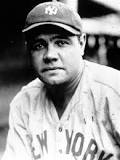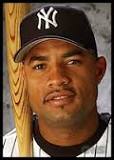As Babe Ruth, the most glorious figure in baseball’s long history, readied himself for the 1930 season, he was approached by reporters who had learned the Babe’s new salary, $80,000, would be $5,000 more than President Herbert Hoover was earning. When questioned a little too closely on the subject, Ruth, then at the height of his powers, grew impatient. “What the hell has Hoover got to do with what I make?” he supposedly snapped. “Besides, I had a better year than he did.”
True or not, it’s a good story. At the time, especially after the economic collapse into what would become the Great Depression, it seemed impossible that a mere ballplayer could earn more than the president. Still, an exception could be, and was, made for Ruth, the great fan favorite whose prodigious slugging and outsized personality had helped lift the game from the dark days of the 1919 Black Sox scandal to unprecedented levels of popularity a decade later.
And, indeed, Ruth was the exception. For the game’s first 100 years, beginning in 1876, players’ salaries seemed generally to be in line with the work they did. They made more than the average Joe, but often had to supplement their earnings with off-season jobs at car dealerships, beer distributorships and the like. My favorite player, Jimmy Piersall, was an off-season ambassador for Cain’s mayonnaise, making appearances at grocery stores to sign autographs for kids and convince their moms to break the Hellman’s habit. Just before free agency was legalized in December 1975, the average player salary was $44,676. At that point, ballplayers still walked among us, blessed with great talent, to be sure, but not yet separated from us by moats of wealth and privilege.
Then came free agency. It was a much needed corrective at first, giving players freedoms long denied them to move among teams and negotiate terms. But that brief period of sunlight and equity has since turned into an ugly, out-of-control greedfest in which players and their canny agents have picked the owners’ pockets as if they were a bunch of hayseeds in an old vaudeville sketch—while the owners, in turn, have done the same dirty to fans with ever-escalating ticket prices and other costs at the ballpark. Now, any major leaguer who earns less than the President of the United States is barely a ballplayer at all—a reclamation project, a late-season call-up from the minors—and probably a source of economic embarrassment and pity among his teammates. The President’s salary at present is $400,000 a year; the minimum major-league salary is slightly higher than that, around $410,000, and the average is now $3.24 million a year.
Nothing will ever get that pig back into the sty. Even so, it remains possible to forget about player salaries momentarily when the action on the field gets exciting during a close game or a gripping stretch of the season. But then some multimillionaire doesn’t run out a grounder, or refuses to sign an autograph, or gets stopped at 2 a.m. for driving his Escalade at 97 mph down a city block, and it comes rushing back to me—that inglorious moment when I realized I’d no longer be able to stomach major league baseball’s absurd salary structure, and when I knew the game had left me for good.
No, it wasn’t Alex Rodriguez’s $252 million contract with the Rangers or his $275 million deal with the Yankees.
It wasn’t Barry Zito signing for seven years and $126 million with the Giants (Zito’s post-contract record at this point: 31-43).
It wasn’t Jason Bay joining the Mets for $16 million a year for six years coming off a season in which he batted .267.
It wasn’t chronic malingerer Carl Pavano (Carl Pavano!) getting $7 million a year from the Twins after posting a 5.10 ERA the previous year.
It wasn’t the unknown Russ Gload (a first baseman with 28 homers in 8 seasons) signing for $1.3 million, or former headcase Rick Ankiel being paid $3.25 million after a .230-11-38 season, or journeyman Randy Wolf at $10 million, or sub-.500 pitcher Brandon Lyon at $5 million.
No, my limit had already been reached several years earlier. That’s when lackluster utility outfielder (career average: .214-14-42) Ruben Rivera was voted off the Yankees by his teammates after it was discovered he had gone into Derek Jeter’s locker, stolen his glove and bat and sold them to a memorabilia collector for $2,500. The detail I almost didn’t notice at the time was that Rivera’s salary with the Yankees for that season was $1 million. One million dollars. Taking inflation into account, Babe Ruth’s 1930 salary of $80,000 with those same Yankees would have come to $860,000 in 2002—considerably less than that of even the lowly thief Rivera.
Knowing that one incredible fact—that baseball had regressed to the point where Ruben Rivera was more amply rewarded for his part in the game than the great Babe Ruth had been for his—who would ever again pay to see a game? Who could ever again raise a truly heartfelt cheer for the Yankees, or any other team for that matter? No, when it comes to salaries, baseball’s disgrace is not even open to debate.



Charley I could not agree more with what you are saying. I was always an avid baseball fan growing up but now I barely pay attention. The same goes for the NBA.
Here here! Or Hear hear! Free agency killed the devotion to the game for me. A money grab, no loyalty. In 1960 I could recite (and probably still could) the starting Yankees’ lineup. Today, I can’t even name three players on the team year over year.
I’ve always loved Baseball – the Game. It is quite a perfect human endeavor, and so well designed. The bat, the ball, the pace, no clock, 90 feet, and so on. All of these things make it so delightful to play, and even to watch.
I fully agree that the wages paid are off the chart, and have resulted in Yankee tickets @ $1,200 per seat. So the game remains great, but the players and their greed have ruined the ballpark experience.
Well, I loved reading your piece, Charley. It is mesmerizing prose and such truth. However, I am still a sucker for the Red Sox, Clay Buchholz and Jacoby Elsbury and I am coming around to the new crew. I did find it a bit ridiculous that Elsbury was out for five days with a groin pull while Campbell was skating on the ice with a broken leg. Baseball players are prima donnas and I wish they could put a cap on the salary and bring back loyalty to both the ownership and players. Keep dreamin’
Interesting article. You should use social websites to
increase traffic and make your site go viral. There are tools which automate this time
consuming process.Visitors can flood your page in no time,
just search in google for:
Rixisosa’s Social Automation